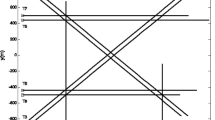Abstract
The particle Probability Hypotheses Density (particle-PHD) filter is a tractable approach for Random Finite Set (RFS) Bayes estimation, but the particle-PHD filter can not directly derive the target track. Most existing approaches combine the data association step to solve this problem. This paper proposes an algorithm which does not need the association step. Our basic ideal is based on the clustering algorithm of Finite Mixture Models (FMM). The intensity distribution is first derived by the particle-PHD filter, and then the clustering algorithm is applied to estimate the multitarget states and tracks jointly. The clustering process includes two steps: the prediction and update. The key to the proposed algorithm is to use the prediction as the initial points and the convergent points as the estimates. Besides, Expectation-Maximization (EM) and Markov Chain Monte Carlo (MCMC) approaches are used for the FMM parameter estimation.
Similar content being viewed by others
References
Ronald P. S. Mahler. Multitarget Bayes filtering via first-order multitarget Moments. IEEE Transactions on Aerospace and Electronic systems, 39(2003)4, 1152–1178.
Tim Zajic and Ronald Mahier. A particle-systems implementation of the PHD multitarget tracking filter. Signal Processing, Sensor Fusion, and Target Recognition XII, 5096(2003), 291–299
B. Vo, S. Singh, and A. Doucet. Sequential Monte Carlo implementation of the PHD filter for multitarget tracking. The 6th International Conference on Information Fusion, Cairns, Queensland, Australia, 2003, 792–799.
Hedvig Sidenbladh. Multi-target particle filtering for the probability hypothesis density. The 6th International Conference on Information Fusion, Cairns, Queensland, Australia, 2003, 800–806
Ba-ngu Vo, Sumeetpal Singh, and Arnaud Doucet. Sequential Monte Carlo methods for multi-target filtering with random finite sets. IEEE Transactions on Aerospace and Electronic Systems, 41(2005)4, 1224–1245.
L. Lin, Y. Bar-Shalom, and T. Kirubarajan. Track labeling and PHD filter for multitarget tracking. IEEE Transactions on Aerospace and Electronic Systems, 42(2006)3, 778–295.
Kusha Panta, Ba-Ngu Vo, and Sumeetpal Singh. Novel data association schemes for the probability hypothesis density filter. IEEE Transactions on Aerospace and Electronic Systems, 43(2007)2, 556–570.
Ba-Ngu Vo and Wing-Kin Ma. The Gaussian mixture probability hypothesis density filter. IEEE Transactions on Signal Processing, 54(2006)11, 4091–4104.
Ronald Mahler. A theory of PHD filters of higher order in target number. Signal Processing, Sensor Fusion, and Target Recognition XV, Proceedings of SPIE, 6235(2006), 1–12.
Ba-Tuong Vo, Ba-Ngu Vo, and Antonio Cantoni. Analytic implementations of the cardinalized probability hypothesis density filter. IEEE Transactions on Signal Processing, 55(2007)7, 3553–3567.
N. J. Gordon, D. J. Samlond, and A. F. M. Smith. Noval approach to nonlinear/non-Gaussian Bayesian state estimation. IEE Proceedings F, 140(1993)2, 107–113.
D. E. Clark and J. Bell. Convergence results for the particle PHD filter. IEEE Transactions on Signal Processing, 54(2006)7, 2652–2661.
A. P. Dempster, N. M. Laird, and D. B. Rubin. Maximum likelihood from incomplete data via the EM algorithm. Journal of the Royal Statistical Society, Series B, 39(1977)1, 1–28.
Franz Pemkopf and Djamel Bouchaffra. Genetic-based EM algorithm for learning Gaussian mixture models. IEEE Transactions on Pattern Analysis And Machine Intelligence, 27(2005)8, 1344–1348.
N. Ueda and R. Nakano. Deterministic annealing EM algorithm. Neural Networks, 11(1998), 271–282.
Mario A. T. Figueiredo and Anil K. Jain. Unsuper vised learning of finite mixture Models. IEEE Transactions on Pattern Analysis and Machine Intelligence, 24(2002)3, 381–396.
G. Celeux and J. Diebolt. The SEM algorithm: a probability teacher algorithm derived from the EM algorithm for the mixture problem. Computational Statistics Quaterly, 2(1986), 73–82.
Kathryn Roeder and Larry Wasserman. Pratical Bayesian density estimation using mixtures of normals. Journal of the American Statistical Association, 92(1997)439, 894–902.
Jean Diebolt and Christian P. Robert. Estimation of finite mixture distributions through Bayesian sampling. Journal of the Royal Statistical Society. Series B, 56(1994)2, 363–375.
Sylvia Fruhwirth-Schnatter. Markov chain Mote Carlo estimation of classical and the dynamic switching and mixture models. Journal of the American Statistical Association, 96(2001)453, 194–209.
Weifeng Liu and Chongzhao Han. Multitarget tracking algorithm based on finite mixture models and equivalent measurement. The 11th International Conference on Information Fusion, Cologne, Germany, 2008, 1544–1551.
Michael Kalandors and Lucy Y. Pao. Multisensor covariance control strategies for reducing bias effects in interacting target scenarios. IEEE Transactions on Aerospace and Electronic Systems, 41(2005)1, 153–173.
Author information
Authors and Affiliations
Corresponding author
Additional information
Supported by the National Key Fundamental Research & Development Program of China (2007CB11006) and the Zhejiang Natural Science Foundation (R106745, Y1080422).
Communication author: Liu Weifeng, born in 1973, male, Ph.D. candidate.
About this article
Cite this article
Liu, W., Han, C., Lian, F. et al. Multitarget state and track estimation for the probability hypotheses density filter. J. Electron.(China) 26, 2–12 (2009). https://doi.org/10.1007/s11767-008-0120-x
Received:
Revised:
Published:
Issue Date:
DOI: https://doi.org/10.1007/s11767-008-0120-x
Key words
- Probability Hypotheses Density (PHD)
- Particle-PHD filter
- State and track estimation
- Finite mixture models



